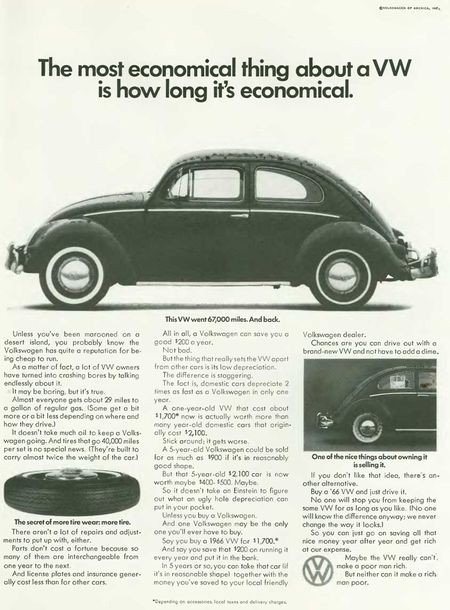暗雲が一つ、晴れそう。
住んでいるマンションの組合(組合員131)の理事(副理事長)に1月からなり、3月には行きがかりで、理事長にならされました。
そこで、「区分所有法」に抵触している組合規約を法にそうべく、会計監事を外部の専門家に委嘱できる---という文案に正す議案を臨時総会に提案準備。組合規約の変更は組合員の4分の3(98人)以上の賛成が必要。
出欠・賛否の投票箱を開いたら、投票率66%(3分の2)で87人ぽっきり。総会は3日後なので、きのう、あわてて手配、やっと4分の3をちょっぴり上まわる101人になった。で、今朝は,存分に眠って起床(遅参のいいわけ)。
【本邦初訳】
VWの経済性は、どれほど長持ちするのでしょう。
孤島に住んでいらっしゃるのでないかぎり、フォルクスワーゲンがどれほど経済的な車であるかって噂は、お耳になさっていることでしょう。
いや、VWのほとんどのオーナーは、VWの経済性の際限のないおしゃべりで、まわりの人をうんざりさせているのも事実なんです。
燃費は、ほとんどの人が、レギュラー1リットルあたり12km強(どんな運転法かで、これより延ばしたり、少なかったりします)。
オイルもそんなには食いません。タイヤも1組で6万4000kmは大丈夫ってのも、珍しいことではないはず(車の自重の倍の重さに耐えられます)。
修理も調整ほとんど要しません。
部品は、ごく初期の年式のものから最新型年式のものまで、ほとんど共通なので、そんなに高価ではありません。
地域にもよりますが、登録料も保険料も、他車以下のはずです。
で、フォルクスワーゲンは結果として、年に200ドル以上もの節約をもたらします。
しめしめ、ですね。
いかし、他車と、断然、差をつけるのは、VWの原価償却でしょうね。
違いは驚くばかり。
米国車の1年後の値下がり率は、フォルクスワーゲンの倍なんです。
1,700ドル前後していたVWの1年後の中古車価格は、新車時に2,100ドルしていた多くの米国産車の1年後の中古価格よりも高く値づけされています。
そうそう、さっきお話しした年に節約できる200ドルを銀行へお預けになると、5年後には貯まったそのお金を持って、地元のおなじみのディーラーへいらっしゃれば、10セントも足すことなく、新車に乗り換えられるのです(もっとも、あなたの車がきちんとしている場合ではありますが)。
写真キャプション:
タイヤの磨耗についての秘密。
フォルクスワーゲンに乗っていてよかったって思うのは、売る時。
C/W ジョン・ノブル
A/D ロイ・グレイス
"The NEWYORKER 1966.08.27
The most economical thing about a VW
is how long it's economical.
Unless you've been morooned on a desert island, you probably know the Volksswagen has quite reputation for being cheap to run.
As a matter of fact, a lot of VW owners have turned into crashing bores by talking endlessly about it.
It may be boring, but it's true.
Almost everyone gets about 29 miles to a gallon of regular gas. (Some get a bit
more or a bit less depending on where and how they drive.)
It doesn't take much oil to keep a Volkswagen going. And tires that go 40,000miles per set is no special news. (They're built to carry almost twice the weight of the car.)
The secret of more tire wear: more tire.
There aren't a lot of repairs and adjustments to put up with, either.
Parts don't cost a fortune because so many of them are interchangeable from one year to the next.
And license plates and insurance generally cost less than for other cars.
All in all, a Volkswagen can save you a good $200 a year.
Not bad.
But the thing that really sets the VW apart from other cars is its low depreciation.
The difference is staggering.
The fact is, domestic cars depreciate 2 times as fast as a Volkswagen in only one year.
A one-year-old VW that cost about $1,700* now is actually worth more than many year-old domestic cars that originally cost $2,100.
Stick around: it gets worse.
A 5-year-old Volkswagen could be sold for as much as $900 if it's in reasonably good shape.
But that 5-year-old $2,100 car is now worth maybe $400-$500. Maybe.
So it doesn't take on Einstein to figure out what an ugly hole depreciation can put in your pocket.
Unless you buy a Volkswagen.
And one Volkswagen may be the only one you'll ever have to buy.
Say you buy a 1966 VW for $1,700.
And say you save that $200 on running it every year and put it in the bank.
In 5 years or so, you can take that car (if it's in reasonable shape) together with the money you've saved to your local friendly Volkswagen dealer.
Chances are you can drive out with a brand-new VW and not have to add a dime.One of the nice things about owning it is selling it.
If you don't like that idea, there's another alternative.
Buy a '66 VW and just drive it.
No one will stop you from keeping the same VW for as long as you like. (No one will know the difference anyway; we never change the way it looks.)
So you can just go on saving all that nice money year after year and get rich at our expense.
Maybe the VW really can't make a poor man rich.
But neither can it make a rich man poor.
C/W John Noble
A/D Roy Grace"The NEWYORKER 1966.08.27
